You might think it’s new, but people have been asking, “Is SEO dead?” for a long time before generative AI became mainstream. See this Quora thread from 2016:

So, it is not a new question, and AI should not cause you to panic. That said, AI has changed a lot in search behavior.
Therefore, I will answer the question and provide some context on what you should expect.
Is SEO dead?
The short answer is no. SEO is not dead.
Why does it seem like that is all SEOs talk about now?
Because people are panicking.
Here’s Google Search with a search parameter for Reddit.
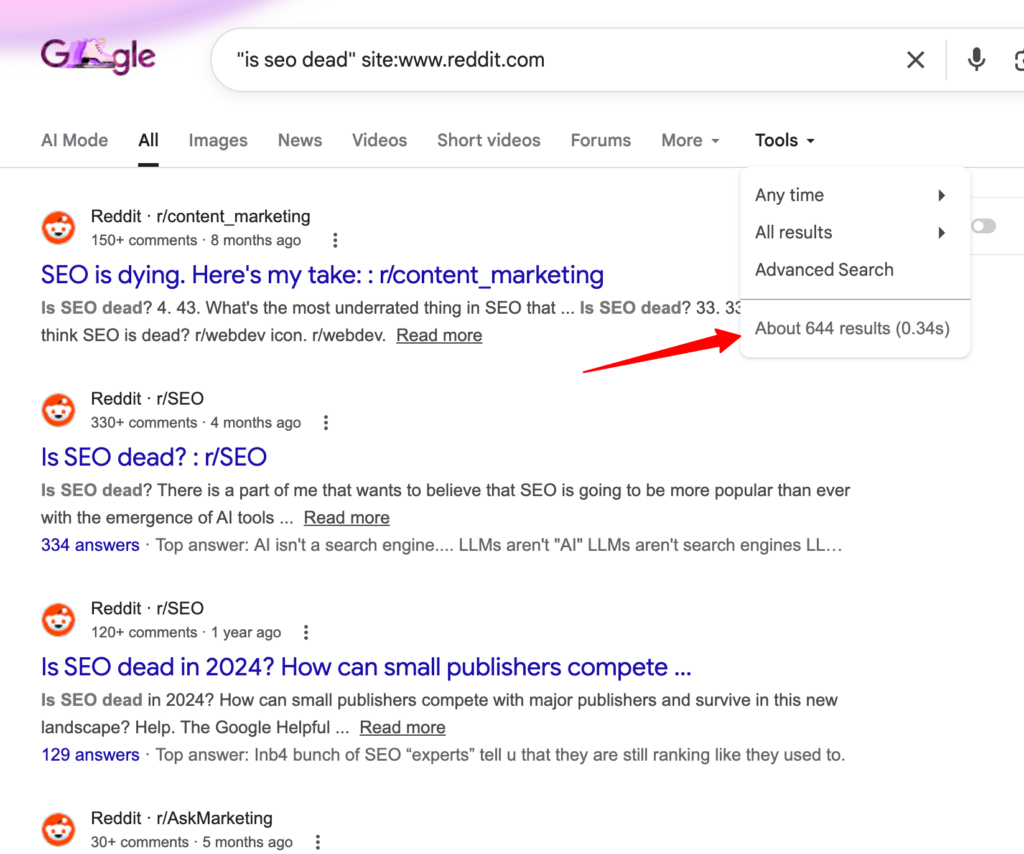
I found over 644 threads asking this question.
Strangely, the interest in the “Is SEO dead” topic spiked towards the end of 2025.
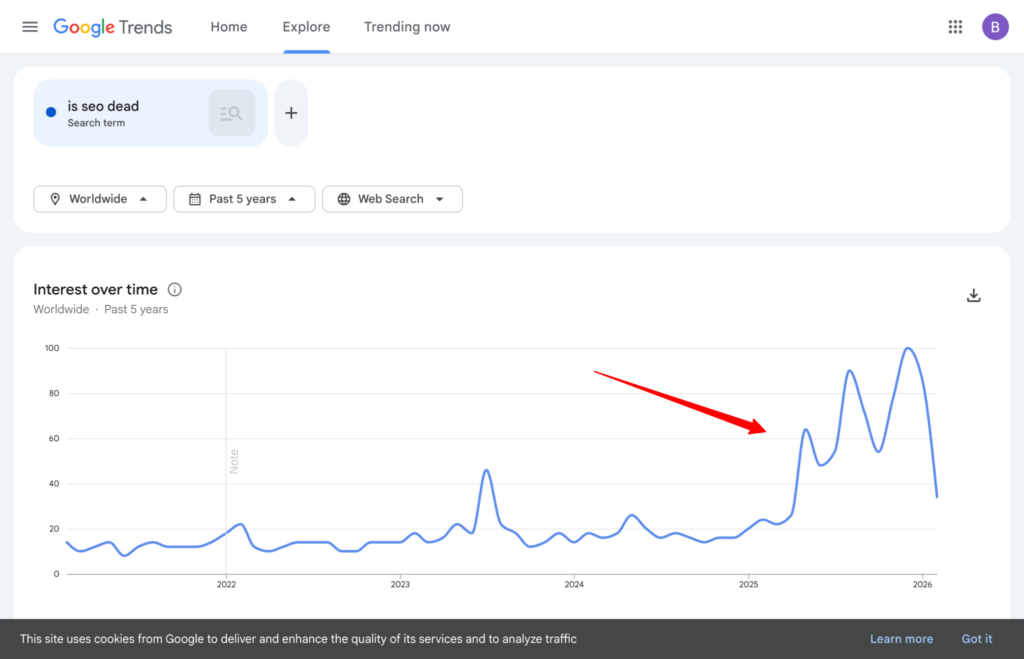
The last time we saw a spike was in July 2023, one month after Google expanded access to AI Overviews (then called Search Generative Experience, or SGE). So, it’s clear the spike was due to panic over people expecting AI Overviews to be the end-all of search at the time.
So, what changed in May 2025?
Well, several things.
First, ChatGPT Search was made available to users everywhere, including logged-out users, in February 2025.
Then, in April 2025, Google announced that AI Overviews in search had reached 1.5 billion monthly users.
Then several studies were released.
There was this one by Ahrefs that said AI Overviews reduced clicks by 34.5% (April 2025) and then by 58% (December 2025).
This one by Semrush predicted that fewer people use search engines than LLMs. In fact, it not only did that, but it also predicted that users on LLMs are 5x more valuable than users on search.
And more and more companies released similar studies.
The funny thing is, amid all of this, research also found that traffic from LLMs converted at a lower rate than that from search engines.
My point is, the data from all of these support both the positive and negative sides. However, there are more articles discussing the negatives than the positives. It also does not help that every traffic decline is now being attributed to the presence of Generative AI tools and AI overview.
Of course, SEOs are going to panic even more and believe it’s the end for them.
The other part is the AEO conversation.
The AEO Conversation
As the debates about whether SEO is alive continue, there is a spike in interest in AEO and how to do it, how it’s more profitable than SEO, and so on. This is mostly because more people are posting about it on social media to get clients. As such, more SEOs see that and are curious and interested.
But what do the numbers say?
The search for “SEO” spiked in 2025.
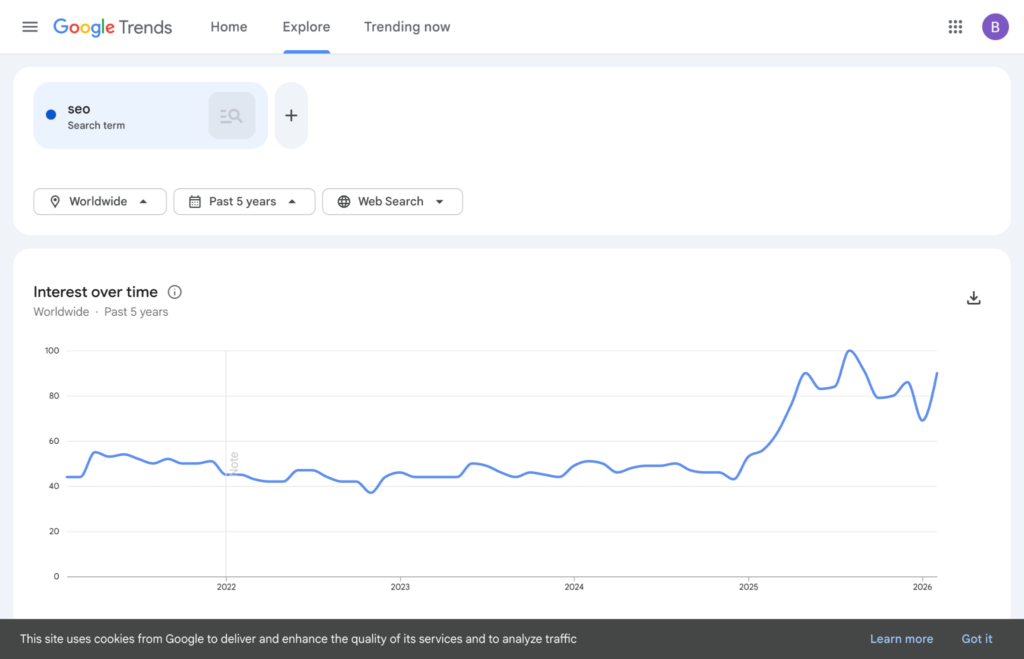
The search for “AEO” also spiked in 2025.
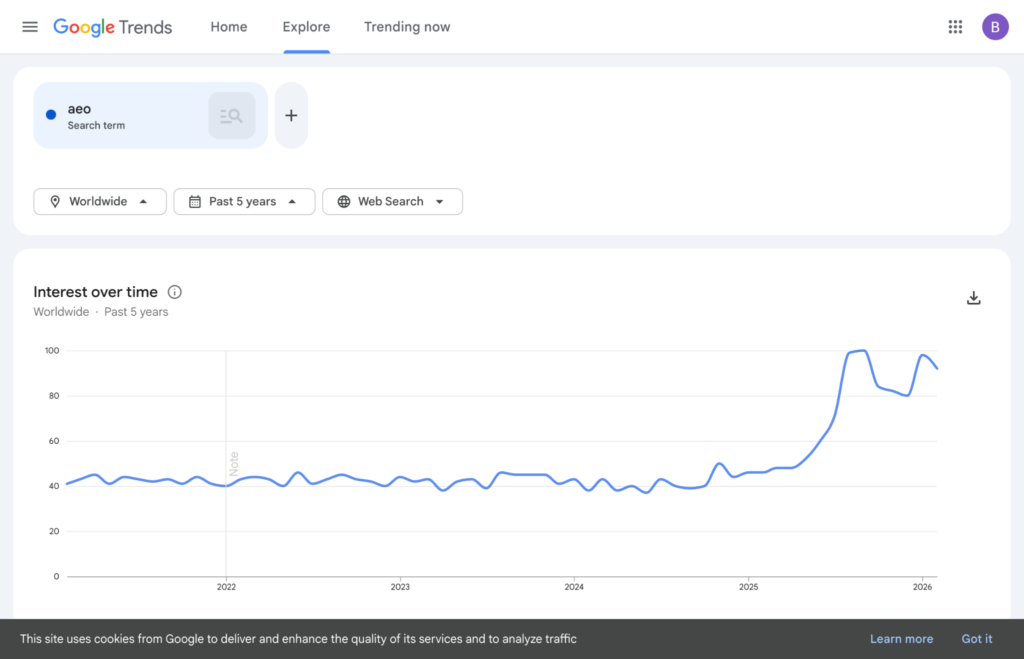
A lot of people are creating threads on the “AEO” topic – about 2,520 results from the last week.
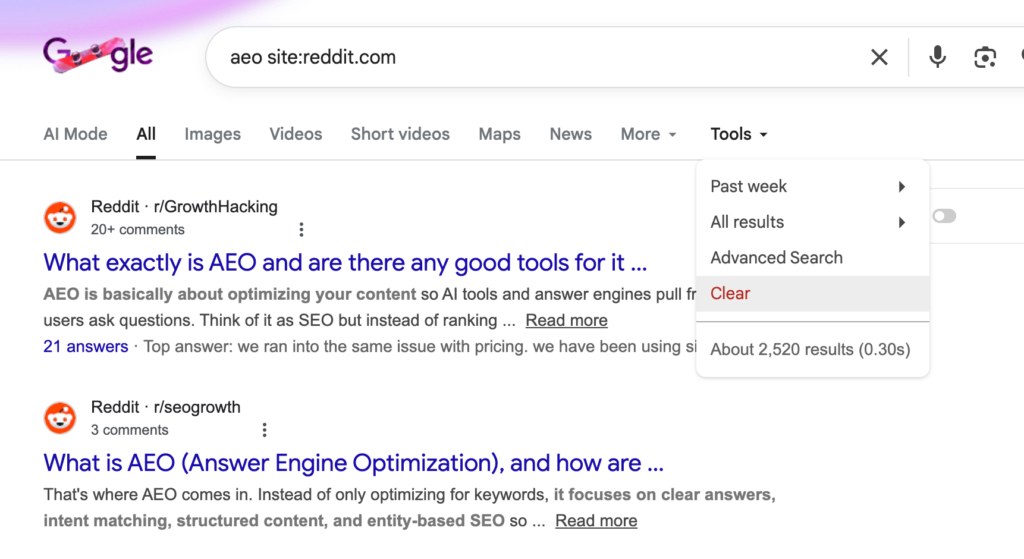
But that is also happening for SEO, with about 23,000 results in that same period:

We also investigated how many people use Google vs Bing vs ChatGPT. Google still holds the most market share, at about 80% while ChatGPT is at 13%.
Then there’s the conversion conversation. Some people might record higher sales numbers from AI traffic. Our check showed that ChatGPT had a higher conversion rate across three websites.
| Engine | Site One | Site Two | Site Three | Average |
|---|---|---|---|---|
| 2.64% | 2.09% | 2.29% | 2.34% | |
| Bing | 1.96% | 1.22% | 1.78% | 1.65% |
| ChatGPT | 4.78% | 4.55% | 2.74% | 4% |
That said, these were all in a service industry, and the data might differ in another industry, e.g., e-commerce, where people want to purchase immediately without any friction.
With these numbers, it is clear that SEO is far from dead, but tactics need to consider users’ search behaviour as it is today.
The Search Behaviour in 2026
Before generative AI, every search happened on search engines. That meant someone who is only looking for information or researching a topic would find you, take what they need, and move on.
For a user like this, you would see traffic numbers and assume you are doing marvellously with your SEO results – after all, you have a lot of traffic.
Now, users who want information only tend to go to generative AI first. Some might go to Google out of habit, but are most likely going to take the information from AI Overviews and move on, clicking nowhere.
However, those considering a service or product are likely to still start their search on Google, click on a website, and decide whether to purchase or complete a form.
That said, because a small fraction of informational searches still resulted in conversions in the past, you are now missing those users due to AI. So, there’s still this negative.
SEOs need to adapt like every other marketing channel.
Social media marketers, for example, have had to move from image only to image and video, to hashtags working, to keywords being the thing, to videos mostly, to almost nothing but videos working for organic, and so on. They fight the algorithms every day, and SEOs just need to learn to adapt.
It is not a conversation of SEO vs AEO vs GEO or whatever acronym is created, but about combining all of these into one search optimisation strategy to ensure you rank and are mentioned/linked to from any of these platforms.
Why SEO Isn’t Going to Disappear Any Time Soon
1. AI Halucination and Accuracy:
You can converse with AI, but cannot be certain that the information is 100% accurate. Exhibit A:

Some AI platforms are better than others, but AI is still a long way away from replacing traditional search. People still want accurate information, and if they are looking to shop, they want recommendations from humans rather than AI (another reason why platforms like Reddit will still thrive).
2. Evolving search algorithms:
Search engines like Google make their money from ads in search results. If AI replaced search, the likelihood that publishers would hide their sites from Google or stop creating content would be high, which means searchers might not find any new information and eventually stop using Google to find it.
Google will do whatever it can to protect (and increase) its ad revenue. So while they will provide more AI features, it’s likely those would be balanced with ensuring businesses still create content, though ranking would be more difficult to ensure businesses also pay for Ad space.
3. Increasing internet usage:
As global Internet penetration increases, more people use search engines to find products, services, and information. With more search queries happening now than before, there’s an opportunity for businesses to sell to those searching for products or services.
4. Established habits:
Habits can change across generations, but for now, the habit is opening a browser and typing whatever to find information.That would still take some time to change.
How can SEO Specialists Thrive with AI Search?
It’s simple: optimize for SEO and AEO at the same time. SEO brings in 80% of the search traffic, but you shouldn’t ignore the 20% that comes from AI platforms.
Optimizing for AI platforms can be a full post on its own, but I will summarize a few things that have worked for my team.
1. Structure Content in the Right Way
The days of writing for quantity are long past. You need to go straight to the point and answer the topic. If you are writing a how-to guide, no one wants the history of that topic or who first came up with it; explain only the relevant things and go straight to the how-to.
Secondly, use formats that AI uses. That includes bullets, lists, and tables. These are more important now than ever. Humans love them, too, because they make content easy to skim. Note that they are not relevant for every section, so when not relevant, do not force them in. Benefits still exist in the use of paragraphs.
Also, look at what is covered in the AI Overview and AI answers, and treat those as the relevant content for that search. For example, see this query on “what is SEO”:
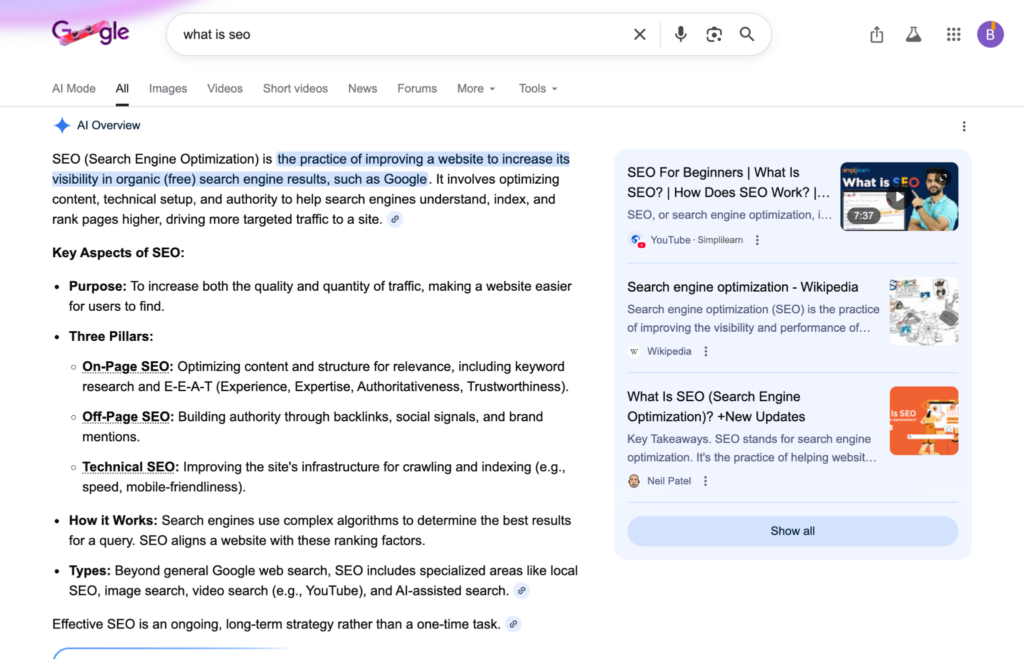
The breakdown shows that the following are important for answering this topic: definition, purpose, types, categories, and how it works. Take that as your first point of research in terms of what you need to cover. Of course, regular SERP analysis should not be ignored because you will get even more areas from that.
2. Don’t Sweat Over Informational Queries
The purpose of informational queries has always been to obtain information only. Sure, it can convert, but not always. If you are seeing fewer clicks to your informational pages, but you are still in the top 3 and are cited by AI, don’t stress over that, as it is expected.
Focus more on your commercial and transactional searches, as they would still result in clicks more often than not.
3. Use AI Tools
Look into AI-powered SEO tools. With more work needed on SEO, you need to ensure you are getting the cost and time benefits by using AI SEO tools for keyword research, link building, content research, SERP analysis, content writing, and local SEO.
For example, with Konvart:
- You can use data from its keyword research tools in its AI content creation tools.
- Get AI-written SEO content that is written based on SERP analysis
- Get SERP analysis data for content creation (through the content brief)
- Get AI support with link building through its Digital PR and Outreach Support tools, and more
- Get local SEO suggestions based on local search analysis
See our post on keyword analysis and where AI tools might come in, SERP analysis, and content writing for SEO.
4. Optimize for E-E-A-T Principle (Experience, Expertise, Authoritativeness, Trustworthiness)
AI content is published on several websites every day. This means more content for Google to sift through and determine relevance. Links can help alongside EEAT.
To optimize for EEAT, consider the following:
- Cite your sources: Use credible sources like academic journals, government websites, and well-established blogs or news outlets.
- Provide evidence: Support your claims with data, statistics, or case studies. Visual aids like charts and graphs can also enhance understanding.
- Build your website’s authority: Establish yourself as a thought leader in your industry by contributing to relevant publications, speaking at conferences, or participating in online communities.
- Prioritise user experience: Ensure your website is easy to navigate, loads quickly, and is mobile-friendly.
- Protect user privacy: Adhere to data privacy regulations and be transparent about collecting and using user information.
Benefits of SEO
If you have been an SEO specialist for years, you already know these. These benefits still stand, even with AI.
SEO Provides A High Return On Investment
ROI is the main objective of good SEO.
Among all internet marketing strategies, SEO offers one of the highest returns on investment. And the effects endure for a long time.
While conducting a Google search, a person is actively seeking:
- A response to their question
- Goods or services
If your website appears at the top of search results, customers are more likely to click it and purchase.
In contrast, when you stop paying for commercial advertising, the traffic ceases. One compounding marketing tactic is SEO. When done correctly, it gradually gains more traction and improves your outcomes.
This offers a longer-term, significantly more significant return on investment.
SEO Can Get You Consistent Targeted Traffic To Your Website
The competition in online business is only going to grow. Acquiring sufficient internet visibility is becoming increasingly difficult amid the growing noise in the market.
This is where SEO thrives.
When your target customer is looking for your goods or services, SEO helps you come to the forefront. It also maintains consistency.
You can appear in the SERPs every day of the week.
Your website appears whenever someone in your target audience searches. This generates steady, high-quality traffic, which raises leads and revenue.
SEO Provides A Real Long-Term Competitive Advantage
SEO provides an advantage over competitors that is difficult to overcome.
You lose visibility if a competitor spends more on paid advertisements than you do. With SEO, that is different.
Getting into the top ranks takes a lot of work. It is, however, similarly tricky for your competitors to rank higher than you once you are there.
This implies you will still receive visitors and sales despite the ranking.
The Future of SEO
No one can predict the future, but SEO is still here for now and will be for at least the next five years.
Nevertheless, SEOs need to understand that search also occurs on other platforms, including Generative AI and social media. It’s called “Search Engine Optimization”, not “Google Search Engine Optimization”. Adaptability is important.
AI continues to transform various industries, and SEO is no exception. Google’s AI algorithms already play a significant role in determining search engine results by interpreting the nuances of user queries.
More advanced AI technologies will further personalise search experiences and add more AI-related features, pushing SEO specialists to optimise for the search behaviour that would exist as these happen.
So, is SEO dead? No. It still works for businesses looking to increase visibility, engage their audience, and drive conversions.

